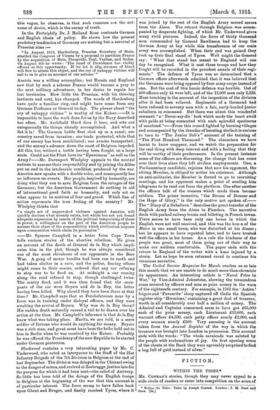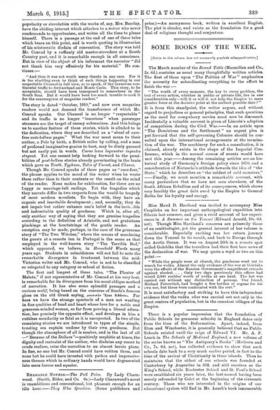FICTION.
WITHIN TIIE TIDES.*
MR. CONRAD'S stories, though they may never appeal to a wide circle of readers or enter into competition on the score pt • Wition Ore Tides. • Taloa by Joseph Conrad. London: J. N. Dent am; sone. 1.80.)
popularity or circulatiOn with the works of, say, Mrs. Barclay, have the abiding interest Which attaches to a writer who never condescends to opportunism, arid writes all the time to please himself. There is a passage at the end of one of these tales which bears on this point, and is worth quoting in illustration of his aristocratic disdain of convention. The story was told Conrad by a ruffianly old master-stevedore at a South Country port, and it is remarkable enough in all conscience. But in view of the object of his informant the narrator "did not thank him very effusively for his material." He eon- Clines :— " And then it was not worth many thanks in any ease. For it is too startling even to think of such things happening in our respectable Channel in full view, so to speak, of the luxurious con- tinental traffic to Switzerland and Monte Carlo. This story, to be acceptable, should have been transposed to somewhere in the South Seas. But it would have been too much trouble to cook it for the consumption of magazine readers."
The story is dated "October, 1910," and now even magazine readers would not demand the transference of which Mr. Conrad speaks. Our Channel is no longer "respectable" and its traffic is no longer " luxnrious" when passenger steamers are the target of enemy submarines. And this brings us to another feature of these stories, which is alluded to in the dedication, where they are described as a "sheaf of care- free ante•bellum, pages." What the war must mean to their author, a Pole by birth, a British sailor by calling, and a man of profound imaginative genius to boot, may he dimly guessed but not easily put in words. Curse levee loguuntur ingentes atupeut. Yet one cannot help looking forward to the possi- bilities of post-bellum stories already germinating in the brain which gave us Youth, Typhoon, Tales of Unrest, and Chance.
Though Mr. Conrad speaks of these pages as "care-free," the phrase applies to the mood of the writer when he wrote them rather than tc their contents or the result on the mind of the reader. None makes for exhilaration, for there are no happy or marriage-bell endings. Yet the tragedies which they' narrate differ in two respects from the would-be tragedy of most modern novelists. To begin with, they have an organic and inevitable development ; and, secondly, they do not impair but rather enhance one's belief in the invii,ible and indomitable quality of goodness. Which is, after all, only another way of saying that they are genuine tragedies according to the definition of Aristotle, and not gratuitous pluekings at the heartstrings of the gentle reader. An exception may be made, perhaps, in the case of the gruesome story of "The Two Witches," where the means of murdering the guests at a remote inn in Portugal is the same as that employed in the well-known story "The Terrible Bed," which appeared, we believe, in Household Words many years ago. Students in coincidences will not fail to note the remarkable divergence in treatment between the mid- -Victorian writer and Mr. Conrad, who is not to be classified or relegated to any category or school of fiction.
The first and longest of these tales, "The Planter of Malata," if not representative of Mr. Conrad at his very best, is remarkable for its divergence from his usnal oblique method of narration. It has also some splendid passages and a curious motif, being based on the converse of Steele's famous gloss on the old Greek saying, peutratbr 'Epees bade/a, For here we have the strange spectacle of a man not wanting in fure qualities of head and heart whose love for a noble and generous-minded woman, so far from proving a liberal educa- tion, has precisely the opposite effect, and develops in him a ruthless mendacity as fatal as it is unexpected. In two of the remaining stories we are introduced to types of the simple, trusting sea captain undone by their own goodness. lint though the atmosphere of all is sombre, and in the last of all —" Because of the Dollars "—positively mephitic at times, the dignity and restraint of the author, who disdains any resort to crude realism, raise the narration to an almost heroic plane. In fine, no one but Mr. Conrad could have written them, and none but he could have invested with pathos and impressive- ness themes which in ordinary hands would have degenerated into mere horror and squalor.











































 Previous page
Previous page